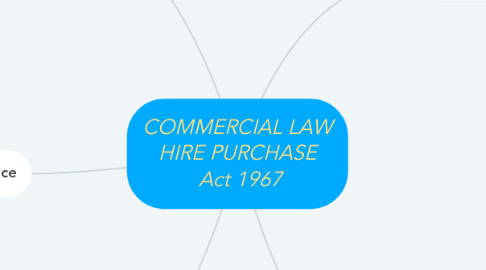COMMERCIAL LAW HIRE PURCHASE Act 1967
создатель Teng Cyun Shen

1. Terminologies
1.1. Owner
1.1.1. Person who lets or has let goods to a hirer under a hire-purchase agreement.
1.2. Hirer
1.2.1. Person who takes or has taken goods from an owner under a hire-purchase agreement.
1.3. Dealer
1.3.1. A person not the hirer or the owner who makes negotiations that leads to the making of a hire purchase agreement.
2. Price
2.1. Hire Purchase Price
2.1.1. Defined as ‘the total sum payable by the hirer under a hire purchase agreement in order to complete the purchase of goods.
2.1.2. Hire purchase price includes deposit, monthly installments and monthly interest.
3. Goods
3.1. All consumer goods
3.1.1. Eg; goods are television sets, washing machines, air conditioners and sewing machines.
3.2. Motor vehicles, namely –
3.2.1. Invalid carriages
3.2.2. Motor Cycles
3.2.3. Buses, including stage buses
4. Introduction
4.1. A hire-purchase agreement is a contract of hire for a fixed period at a fixed rental which also grants the hirer an option to buy.
4.2. Involve a finance company as owner ie: the finance company buys the goods from the dealer where the dealer is paid for the price of the goods. Then the finance company becomes the owner for the hire-purchase agreement purposes and lets the goods out to the hirer for a certain duration during which period, the hirer pays the price of the goods by monthly instalments.
4.3. The hirer is not obliged to purchase and thus is not a person who has “agreed to buy the goods”. Therefore, if he sells the goods before he has exercised the option to purchase, he cannot pass a good title to the buyer.
5. Hire Purchase Agreement
5.1. In contract of hire purchase, property in goods is not transferred to the hirer.
5.2. The hirer only obtains possession over the goods but not the ownership.
5.3. The property in goods or ownership remains with the owner until the full payment is made by the hirer.



